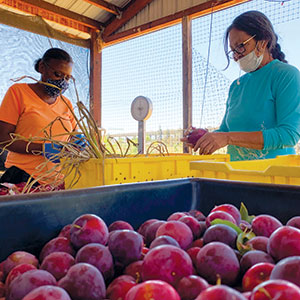Out beyond the rusted farm equipment, the parking-lot roosters and the upturned wheelbarrows, a busy six-acre urban farm continues to evolve in the Covid-19 era. To paraphrase Rumi, I met the peacocks there.
At the far-back corner of Emma Prusch Farm Park, in the trenches of East San Jose’s Mayfair neighborhood, Veggielution, in normal times, provides a smattering of community services. One can take cooking classes, volunteer in the garden or pick up boxes of fresh vegetables direct from the farm just steps away. To get there, one enters the park from the grimy thoroughfare of King Road and then ventures past wooden cow placards, 10-foot-tall sunflower stalks and bored roosters sleeping on the wood chips that cover the parking medians. After passing through a white-picket gate, one enters Veggielution, which sits directly up against the sprawling 101/680 interchange.
I decide to show up on a Friday, not only to catch up with the peacocks, but also to see how Veggielution is reinventing itself in the Covid-19 era. In normal times, Veggielution harvests, assembles and packages farm boxes every Friday, for sale to the public on Saturday. The farm stand caters to a regular pool of customers. Now, in collaboration with the Si Se Puede! collective, an amalgam of five nonprofit community organizations, Veggielution is pivoting its operation by distributing boxes of food to 40 families in need throughout East San Jose. The families receive fresh local produce to complement the everyday goodssuch as flour, rice or canned beansin their household.
“Each one of the organizations within the collective gave us the names of the families who they thought was most in need of the food,” says Emily Schwing, Veggielution’s marketing and impact manager, who keeps using the word ‘resiliency.’ As we shuffle around the property, I also learn that Veggielution’s food entrepreneurs have been reallocated to a new project distributing food to seniors.
In a story I covered 18 months ago, Veggielution started an initiative to identify rogue food-cart operators and train them to navigate city red tape so they could cook their own food and conduct legit business with permitted carts around town. Since Covid-19 essentially stymied the whole endeavor, these food entrepreneurs are now employed to cook hot-food packages for seniors, elderly people living alone or those who can’t fend for themselves. Veggielution distributes the packages directly to senior complexes or safe parking lots for pick up.
“It’s a more dignified way of giving them food, rather than having them wait in line,” Schwing said.
As Schwing and I continue around the farm, masked up under the blazing-hot sun, we pass by volunteers harvesting vegetables for future boxes, plus a few farmers and the ubiquitous groups of uninvited peacocks that breed on the property and refuse to leave. We eventually come to various farms and orchards, out by the freeway overpass. The offerings have expanded since the last time I showed up. I see tomatoes, peppers, broccoli and Mexican corn for masato make tamales. One empty field is slotted for a potential pumpkin patch come October. The orchard at the back produces plums, figs, apricots, apples and mulberries, to name but a few.
Schwing then points to some empty areas slotted for future projects. Funded by a grant from the California Department of Food and Agriculture, a shipping container will soon arrive, to function as a solar-powered refrigeration unit, allowing for more storage during these trying times. The refrigeration unit will be completely off-the-grid. Pandemic or not, if the farm’s power ever goes down, or if any other emergency arises, Veggielution will still be able to save and refrigerate food.
A solar-powered composting operation is also in the works, allowing Veggielution to process more quantities of its own food waste, creating more compost for the farm itself, thereby maintaining a more closed-loop system, contributing less to the climate crisis currently unfolding. Solar power will run a machine to push air through the compost system, helping to break down materials much faster.
As we walk around, the sun continues to beat down upon us; but just like the peacocks, I don’t want to leave.




